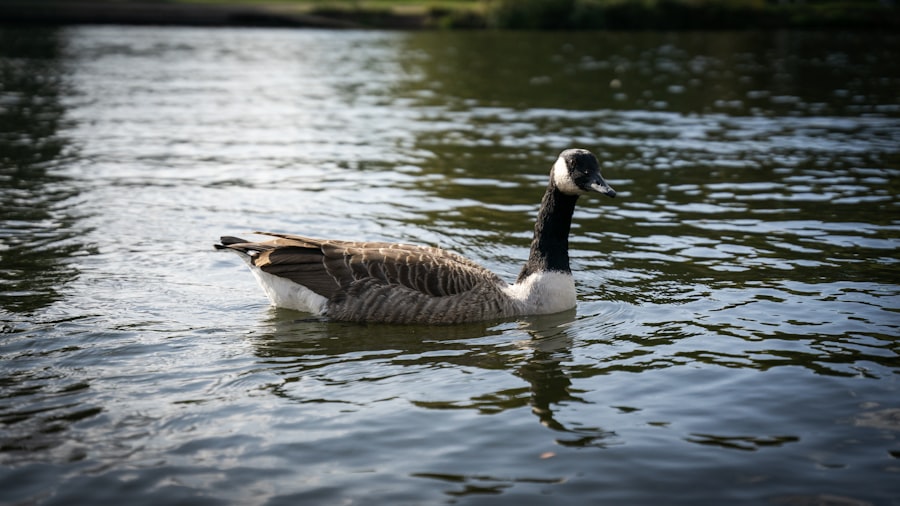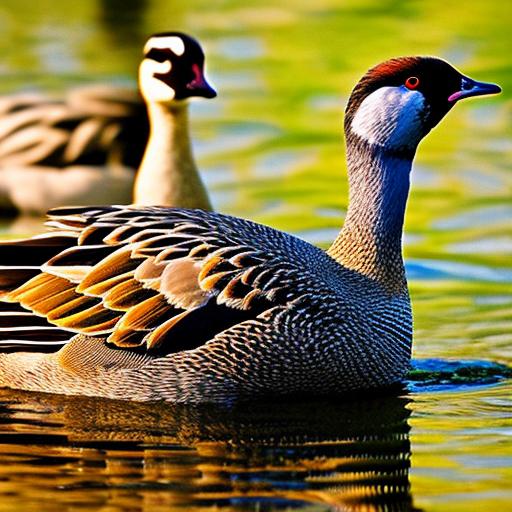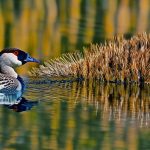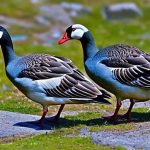Geese have been domesticated for thousands of years, with evidence of their presence dating back to ancient Egypt and Rome. These birds were initially kept for their meat, eggs, and feathers, but over time, they have also become popular as companions and pets. Today, people keep geese for various reasons, including farming, pest control, and simply as a source of joy and companionship.
Key Takeaways
- Keeping geese can be a rewarding and enjoyable experience for those interested in poultry farming.
- Geese can provide a variety of benefits, including meat, eggs, feathers, and pest control.
- Domesticated geese come in different breeds, each with unique characteristics and suitability for different climates and purposes.
- When keeping geese, factors such as space, predator protection, and access to water and food must be considered.
- Geese require adequate shelter and a balanced diet to maintain their health and well-being.
Benefits of Keeping Geese
One of the main benefits of keeping geese is their versatility as a source of food. Geese are known for their delicious meat, which is often described as rich and flavorful. They also lay large eggs that can be used in cooking or hatching to produce more geese. Additionally, geese have soft and durable feathers that can be used for insulation or in the production of pillows, comforters, and other products.
Another benefit of keeping geese is their natural pest control abilities. Geese are excellent grazers and can help keep grass and weeds under control. They also eat insects and other small pests, making them a valuable asset in gardens or farms. Their presence can help reduce the need for chemical pesticides and promote a more sustainable and eco-friendly approach to pest management.
Furthermore, geese can make wonderful companions and pets. They are intelligent birds that can form strong bonds with their human caretakers. Geese are known for their loyalty and protective nature, making them excellent guard animals. They can also be trained to perform tricks or participate in activities such as herding or agility competitions.
Types of Geese Suitable for Domestication
There are several popular breeds of domesticated geese that are suitable for keeping as pets or for farming purposes. Some of these breeds include:
1. Toulouse: Toulouse geese are large birds known for their calm and gentle nature. They have a distinctive gray plumage and are often raised for their meat.
2. Embden: Embden geese are one of the most common breeds of domesticated geese. They are large, white birds with a friendly and docile temperament. They are often raised for meat and feathers.
3. Chinese: Chinese geese are smaller in size compared to other breeds but are known for their striking appearance. They have a unique knob on their beak and come in various colors, including white, gray, and brown. They are often kept for their ornamental value or as pets.
4. African: African geese are medium-sized birds with a striking appearance. They have a black head and neck, with a white body and orange bill. They are known for their loud honking and make excellent guard animals.
Factors to Consider When Keeping Geese
Before deciding to keep geese, there are several factors that need to be considered. Firstly, geese require ample space to roam and graze. They are active birds that need room to stretch their wings and explore their surroundings. A minimum of 100 square feet per goose is recommended to ensure they have enough space to thrive.
Climate is another important consideration when keeping geese. While geese can adapt to various climates, extreme heat or cold can be detrimental to their health. It is important to provide them with adequate shelter and protection from harsh weather conditions.
Keeping geese also requires a significant amount of time and effort for care and maintenance. Geese need daily feeding, fresh water, and regular cleaning of their living area. They also require social interaction and mental stimulation to prevent boredom and promote overall well-being.
Housing Requirements for Geese
Geese require suitable housing structures that provide them with protection from predators, shelter from the elements, and enough space to move around comfortably. There are several types of housing structures that can be used for geese, including sheds, barns, or specially designed goose houses.
When building a goose house, it is important to use materials that are sturdy and can withstand the elements. The house should have proper ventilation to prevent the buildup of moisture and ammonia from the geese’s droppings. It should also have a secure door or gate to keep predators out.
Keeping the goose house clean and comfortable is essential for the health and well-being of the geese. Regular cleaning of the bedding and removal of droppings is necessary to prevent the spread of diseases. Providing fresh bedding, such as straw or wood shavings, can help keep the geese comfortable and prevent the buildup of odors.
Feeding and Nutrition for Geese

Geese have specific nutritional requirements that need to be met in order for them to thrive. A balanced diet for geese should consist of a combination of grains, greens, and protein sources. Commercially available goose feed can be supplemented with fresh vegetables, fruits, and grass to provide a varied diet.
It is important to provide geese with access to fresh water at all times. Geese need water for drinking, bathing, and digestion. A shallow pool or trough can be provided for them to swim in, as this helps keep their feathers clean and healthy.
Feeding geese should be done on a regular schedule to establish a routine. It is important to monitor their food intake and adjust portion sizes accordingly. Overfeeding can lead to obesity and health issues, while underfeeding can result in malnutrition.
Health and Veterinary Care for Geese
Like any other animal, geese are susceptible to various health issues that need to be addressed promptly. Common health issues in geese include respiratory infections, parasites, and foot problems. Regular veterinary check-ups are recommended to ensure the overall health and well-being of the geese.
Preventive measures can also be taken to maintain good health in geese. This includes providing a clean and hygienic living environment, regular grooming to prevent feather mites, and vaccination against common diseases. It is important to observe the geese closely for any signs of illness or distress and seek veterinary care if necessary.
Finding a reliable veterinarian who specializes in avian care is essential for the health and well-being of geese. They can provide guidance on proper nutrition, vaccination schedules, and treatment options for any health issues that may arise.
Geese Behaviour and Social Needs
Understanding the behavior of geese is important for their overall well-being. Geese are social animals that thrive in the company of others. They form strong bonds with their flock mates and can become stressed or anxious if kept alone.
Geese also have a natural instinct to protect their territory and flock. They are known for their loud honking and aggressive behavior towards potential threats. Providing them with a safe and secure environment is important to prevent any conflicts or injuries.
To keep geese happy and healthy, it is important to provide them with mental stimulation and enrichment. This can be done through the use of toys, puzzles, or activities that encourage natural behaviors such as foraging or swimming. Regular interaction with their human caretakers is also important to build trust and strengthen the bond between geese and humans.
Pros and Cons of Having a Pond for Geese
Having a pond for geese can provide several benefits, but it also comes with its own set of challenges. Some of the benefits of having a pond for geese include:
1. Natural habitat: Geese are waterfowl and naturally thrive in aquatic environments. Having a pond allows them to engage in natural behaviors such as swimming, diving, and foraging for aquatic plants.
2. Cooling effect: During hot weather, geese can cool off by swimming in the pond. This helps regulate their body temperature and prevents heat stress.
3. Source of food: Ponds often attract insects, small fish, and other aquatic creatures that geese can feed on. This provides them with a natural source of food and reduces the need for additional feeding.
However, there are also drawbacks to having a pond for geese. Some of these include:
1. Maintenance: Ponds require regular maintenance to prevent the buildup of algae, weeds, and other unwanted vegetation. This can be time-consuming and may require the use of chemicals or mechanical equipment.
2. Safety concerns: Ponds can pose safety risks for geese, especially if they are not properly secured. Geese may drown if they become trapped in the water or if predators have easy access to the pond.
3. Disease transmission: Ponds can be a breeding ground for bacteria, parasites, and other pathogens that can affect the health of geese. Regular water testing and treatment may be necessary to maintain a healthy pond environment.
Alternatives to Ponds for Keeping Geese
If having a pond is not feasible or desirable, there are alternative options for providing water for geese. Some of these include:
1. Kiddie pools: Large plastic or rubber kiddie pools can be used to provide geese with a shallow water source for swimming and drinking. These pools can be easily cleaned and filled with fresh water as needed.
2. Water troughs: Water troughs designed for livestock can also be used to provide geese with access to water. These troughs should be cleaned regularly to prevent the buildup of algae or bacteria.
3. Water buckets: Large buckets or basins can be used as temporary water sources for geese. These should be emptied and refilled with fresh water daily to ensure cleanliness.
Regardless of the method used, it is important to provide geese with clean and fresh water at all times. Water is essential for their hydration, digestion, and overall well-being.
Keeping geese can be a rewarding and fulfilling experience, whether it is for farming purposes or as companions and pets. Geese provide a source of food, feathers, and pest control, while also offering companionship and entertainment. However, it is important to consider the various factors involved in keeping geese, such as space requirements, climate considerations, and the time and effort needed for care and maintenance.
Providing suitable housing, feeding a balanced diet, and ensuring proper veterinary care are essential for the health and well-being of geese. Understanding their behavior and social needs can help create a harmonious environment for them to thrive. While having a pond can provide several benefits, it also comes with its own set of challenges. Alternatives such as kiddie pools or water troughs can be used to provide water for geese if a pond is not feasible.
In conclusion, keeping geese can be a rewarding and enjoyable experience for those willing to put in the time and effort. Whether for farming purposes or as pets, geese offer a unique combination of benefits that make them a valuable addition to any household or farm.
If you’re considering keeping geese, you might be wondering if you need a pond for them. While geese do enjoy spending time in water, a pond is not necessarily a requirement for their well-being. In fact, there are alternative options that can provide geese with the necessary water elements they need. If you’re interested in learning more about this topic, check out this informative article on poultrywizard.com: Do You Need a Pond to Keep Geese? This article explores different ways to provide water for geese without the need for a traditional pond setup.
Meet Walter, the feathered-friend fanatic of Florida! Nestled in the sunshine state, Walter struts through life with his feathered companions, clucking his way to happiness. With a coop that’s fancier than a five-star hotel, he’s the Don Juan of the chicken world. When he’s not teaching his hens to do the cha-cha, you’ll find him in a heated debate with his prized rooster, Sir Clucks-a-Lot. Walter’s poultry passion is no yolk; he’s the sunny-side-up guy you never knew you needed in your flock of friends!







